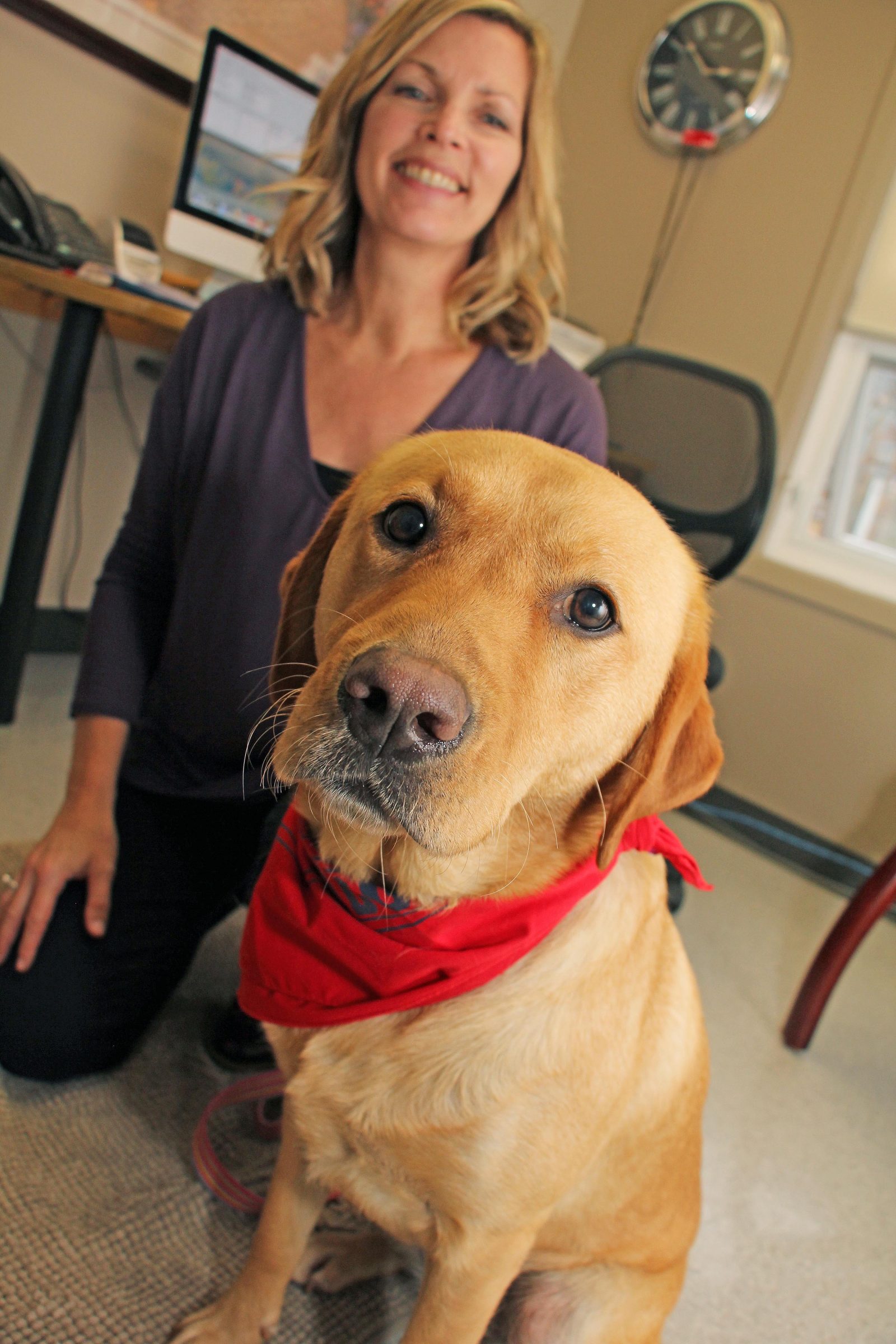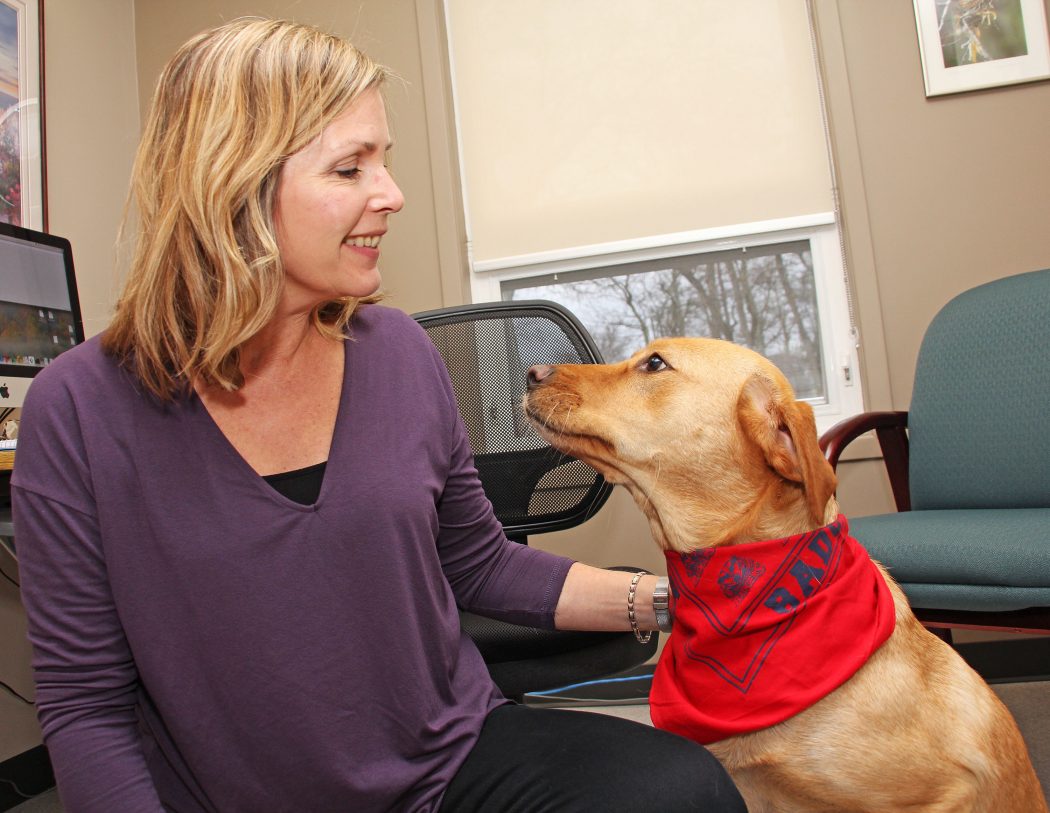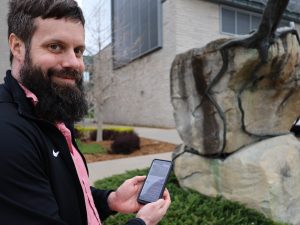 Debbie MacCulloch, Student Health Services’ Mental Health Nurse, and her dog Paisley are working together to help students with their mental health.
Debbie MacCulloch, Student Health Services’ Mental Health Nurse, and her dog Paisley are working together to help students with their mental health. A belly rub and the occasional treat are the only payment Paisley asks for during her shift with Brock’s Student Health Services team.
For the past two months, the three-year-old yellow Labrador has been accompanying her owner, Brock Mental Health Nurse Debbie MacCulloch, to Student Health Services once a week to help out with her appointments.
“I see a lot of students who are struggling and dealing with their mental health,” said MacCulloch. “When they interact with Paisley, it helps them to settle. She is a very calming influence.”
The idea to bring a therapy dog along to work first came to MacCulloch when she observed the popularity of the University’s regular puppy room events, which bring dogs to campus as a source of stress relief.

Debbie MacCulloch, Student Health Services’ Mental Health Nurse, and her dog Paisley are working together to help students with their mental health.
“They were lined up out the door,” she said of the many students who attended.
MacCulloch suggested to her superiors that similar benefits could come from having a therapy dog along to help with her appointments, and she knew that Paisley would make the perfect fit.
As if to prove this point further, Paisley added to her previous obedience training by passing her therapy dog certification, with local dog trainer Dave McMahon, on her first try.
Having received full approval from the University and completed the necessary training, Paisley has quickly adjusted to life in her new job.
“Normally she sleeps when we are driving in the car,” said MacCulloch. “But when the signal is put on to turn into the Brock parking lot, she gets up and starts looking around. She jumps out of the car and we come into the building to do a walk through. Then we go to my office, put her mat down and get to work.”
To remind Paisley that she is at work, MacCulloch has given her a special uniform.
“At home she wears a collar, but at work she wears a bandana or scarf to remind her that she is acting in a different role,” she said.
This role has seen Paisley offer the type of assistance that has made therapy dogs a significant resource in the field of mental health.
When she is in here with someone, she is not forming an assessment,” said MacCulloch. “Instead, she is very intuitive to their emotional state. If someone is crying, she will sit up and watch them and let them pet her until they settle. At work, she knows not to sit with me, and to instead care for whoever is in the appointment.”
MacCulloch and Paisley meet students who have mental health concerns and provide an initial assessment, advice, supportive counselling, and treatment and follow-up information for those facing depression, anxiety, mood disorders, suicidal ideation, psychosis eating disorders and grief.
“We want to encourage students to reach out for help if they have concerns,” said MacCulloch. “That’s why we are here.”
While students have seen positive benefits from Paisley’s regular shift, her presence has also had an impact on the Student Health Services team.
“It helps the staff with their stress as well, because now they look forward to Thursdays,” MacCulloch said. “Some of them even bring treats in for Paisley.”
MacCulloch has also enjoyed the impact Paisley has made on her own work routine.
“I have always loved dogs,” she said. “And I love what I do as a mental health nurse on campus. To have the opportunity to combine the two is fantastic.”
MacCulloch’s love of dogs is something she shares with many of her patients, and she believes this plays a key part in Paisley’s success as a therapy dog.
“She gives them hope and makes them feel supported and nurtured,” she said. “Students often miss their pets and the support a therapy dog provides is very helpful when they are dealing with mental health issues on campus. They often sit on the floor with her, and they always feel at least a little bit better when they have seen her.”
The perceptive Labrador is still discovering her new role and is struggling only with the problem of ending an appointment professionally.
“A few times she has tried to leave with a student,” MacCulloch quipped, “But she is quickly learning that her job is here.”
To learn more about the many mental health resources available at Brock, visit brockmentalhealth.ca or brocku.ca/swac








